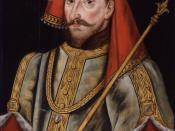Monarchy and kingship is a subject that appears to have fascinated Shakespeare, and in his history plays it is apparent that he is commenting on what he considered to be the notion of kingship, concentrating largely on characteristics such as the divine right of kings and the manner in which individual monarchs exploited this belief to their own ends.
Starting from the deposition of Richard II, through the 100 years of civil strife, and culminating with the marriage of Henry VII, which healed the division between the houses of York and Lancaster, Shakespeare presents a view of divine judgement and providence. The theme of a rightful ruler dispossessed, the question of legitimacy and ensuing anarchy, and then providential redemption, recurs in several of his other plays
It appears that even when Shakespeare depicts a king's failings, and displays negative characteristics, it is still possible for us to draw on these, to identify the opposite and determine what the qualities of a good king may then be.
The characteristics that Shakespeare deemed to be desirable were a requirement of the monarch to show that the crown was worthy of loyalty; that the monarch was an impartial administrator of justice; that the monarch had a right to expect justice from his subjects due to the sacrosanct nature of the monarchy; that the monarch exercised office whilst retaining personal dignity; was decisive; possessed the necessary common touch and showed humility; had excellent qualities of leadership; and showed a necessary quality of dedication and an awareness of God.
In Richard II, Shakespeare explores several characteristics of monarchy, namely legitimacy, constraints of the monarch, traditions and customs; rights of monarch and the rights of the subject, effective kingship and responsibilities, and the question of succession.
From the start of Richard II we are aware of...


